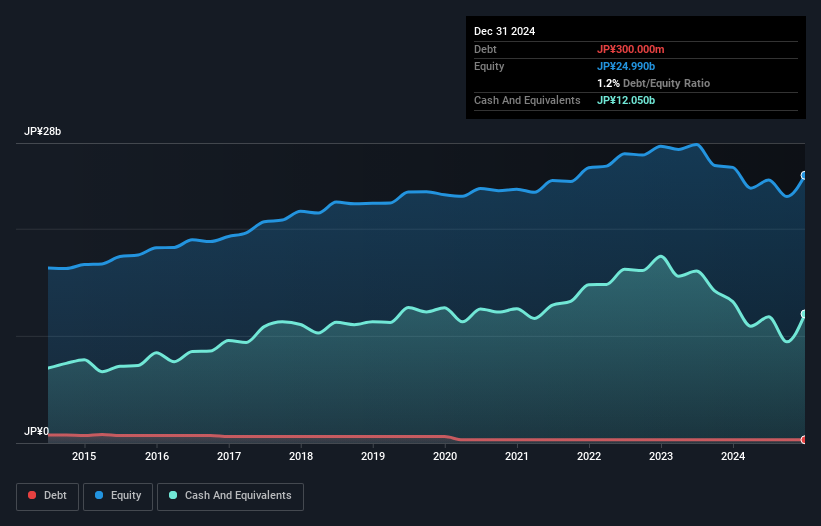
David Iben put it well when he said, 'Volatility is not a risk we care about. What we care about is avoiding the permanent loss of capital.' When we think about how risky a company is, we always like to look at its use of debt, since debt overload can lead to ruin. As with many other companies Funai Soken Holdings Incorporated (TSE:9757) makes use of debt. But the more important question is: how much risk is that debt creating?
When Is Debt A Problem?
Debt is a tool to help businesses grow, but if a business is incapable of paying off its lenders, then it exists at their mercy. If things get really bad, the lenders can take control of the business. However, a more common (but still painful) scenario is that it has to raise new equity capital at a low price, thus permanently diluting shareholders. Of course, plenty of companies use debt to fund growth, without any negative consequences. The first step when considering a company's debt levels is to consider its cash and debt together.
How Much Debt Does Funai Soken Holdings Carry?
The chart below, which you can click on for greater detail, shows that Funai Soken Holdings had JP¥300.0m in debt in December 2024; about the same as the year before. But it also has JP¥12.0b in cash to offset that, meaning it has JP¥11.7b net cash.

How Strong Is Funai Soken Holdings' Balance Sheet?
The latest balance sheet data shows that Funai Soken Holdings had liabilities of JP¥6.27b due within a year, and liabilities of JP¥174.5m falling due after that. On the other hand, it had cash of JP¥12.0b and JP¥4.13b worth of receivables due within a year. So it actually has JP¥9.73b more liquid assets than total liabilities.
This surplus suggests that Funai Soken Holdings has a conservative balance sheet, and could probably eliminate its debt without much difficulty. Succinctly put, Funai Soken Holdings boasts net cash, so it's fair to say it does not have a heavy debt load!
Check out our latest analysis for Funai Soken Holdings
Also good is that Funai Soken Holdings grew its EBIT at 15% over the last year, further increasing its ability to manage debt. There's no doubt that we learn most about debt from the balance sheet. But it is future earnings, more than anything, that will determine Funai Soken Holdings's ability to maintain a healthy balance sheet going forward. So if you're focused on the future you can check out this free report showing analyst profit forecasts .
Finally, a company can only pay off debt with cold hard cash, not accounting profits. While Funai Soken Holdings has net cash on its balance sheet, it's still worth taking a look at its ability to convert earnings before interest and tax (EBIT) to free cash flow, to help us understand how quickly it is building (or eroding) that cash balance. Over the most recent three years, Funai Soken Holdings recorded free cash flow worth 71% of its EBIT, which is around normal, given free cash flow excludes interest and tax. This cold hard cash means it can reduce its debt when it wants to.
Summing Up
While we empathize with investors who find debt concerning, you should keep in mind that Funai Soken Holdings has net cash of JP¥11.7b, as well as more liquid assets than liabilities. And it impressed us with free cash flow of JP¥6.5b, being 71% of its EBIT. So is Funai Soken Holdings's debt a risk? It doesn't seem so to us. When analysing debt levels, the balance sheet is the obvious place to start. However, not all investment risk resides within the balance sheet - far from it. Be aware that Funai Soken Holdings is showing 1 warning sign in our investment analysis , you should know about...
Of course, if you're the type of investor who prefers buying stocks without the burden of debt, then don't hesitate to discover our exclusive list of net cash growth stocks, today.
New: AI Stock Screener & Alerts
Our new AI Stock Screener scans the market every day to uncover opportunities.
• Dividend Powerhouses (3%+ Yield)
• Undervalued Small Caps with Insider Buying
• High growth Tech and AI Companies
Or build your own from over 50 metrics.
Have feedback on this article? Concerned about the content? Get in touch with us directly. Alternatively, email editorial-team (at) simplywallst.com.
This article by Simply Wall St is general in nature. We provide commentary based on historical data and analyst forecasts only using an unbiased methodology and our articles are not intended to be financial advice. It does not constitute a recommendation to buy or sell any stock, and does not take account of your objectives, or your financial situation. We aim to bring you long-term focused analysis driven by fundamental data. Note that our analysis may not factor in the latest price-sensitive company announcements or qualitative material. Simply Wall St has no position in any stocks mentioned.
About TSE:9757
Funai Soken Holdings
Provides consulting services for various industries in Japan.
Outstanding track record with flawless balance sheet and pays a dividend.
Market Insights
Community Narratives




